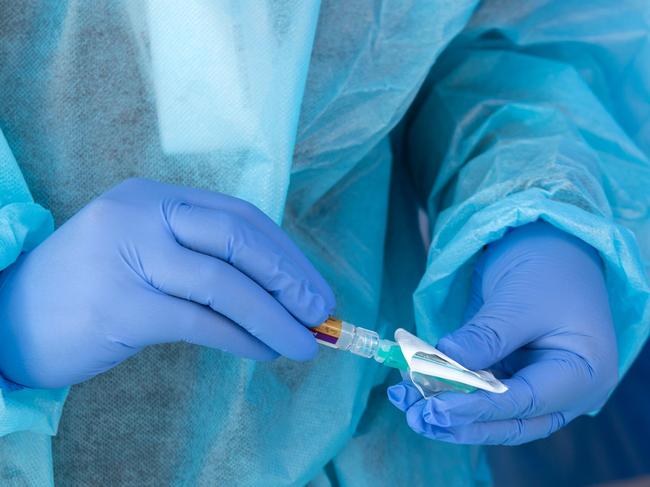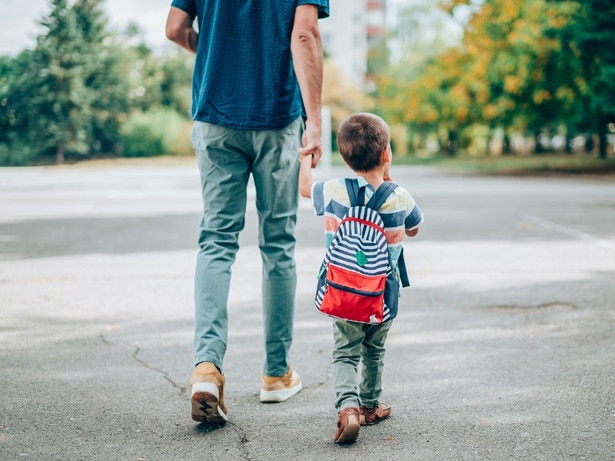How to protect children aged under 5 from Covid-19
The death of a healthy two-year-old Sydney boy after contracting Covid-19 has left parents asking how they can keep their young children safe. Dr Vivek Eranki explains.
Coronavirus
Don't miss out on the headlines from Coronavirus. Followed categories will be added to My News.
Two-year-old Carter Cheung was otherwise healthy before being rushed to hospital on Thursday morning, having become gravely ill the night before.
His parents were unaware their son had contracted Covid-19 until they arrived at the hospital, where the little boy’s life support was turned off two days later.
Like all children under 5, little Carter was unvaccinated, which has raised concerns among parents of toddlers and babies.
We spoke with General Practitioner Dr Vivek Eranki to find out what you need to know to help keep your child safe.
WHAT ARE THE SIGNS AND SYMPTOMS OF COVID?
While the most common Covid-19 symptoms are similar to those caused by other viral illnesses, such as fever, cough and fatigue, Dr Eranki says there is no typical clinical presentation for Covid-19.
“Clinical presentation varies from patient to patient,” says Dr Eranki.
“Covid-19 patients typically complain of altered or loss of taste and/or smell.
“Other symptoms include shortness of breath, muscle pains, sore throat, runny nose, headaches, nausea/vomiting, diarrhoea and rash.”
The clinical presentation in adults and children are similar although children generally have milder symptoms.
You can expect to see symptoms anywhere between two days and two weeks post exposure
WHAT ARE THE POSSIBLE SYMPTOMS OF THE OMICRON VARIANT?
According to RACGP, there is no significant difference in the overall symptom profile of Delta and Omicron.
“All variants cause similar symptoms,” says Dr Eranki.
“The top five most common symptoms in both are runny nose, headache, fatigue, sneezing and a sore throat.”
While the Omicron variant is more contagious, symptoms are often less severe, particularly in children.

HOW CAN I PREVENT COVID IN MY CHILD?
While there is no way to prevent a Covid-19 infection, there are steps you can take to minimise the risk.
Where possible, teach your child to:
Regularly wash their hands with soap and water, or use hand sanitiser;
Cover their nose and mouth with their elbow or a tissue when coughing or sneezing;
Try to keep a distance from others.
“Where social distancing is not possible, prioritise the use of open and well-ventilated spaces,” says Dr Eranki.
CAN MY CHILD GET REINFECTED?
According to Dr Eranki, there is lack of robust evidence that examines rates of re-infection in children.
“According to a report by the UK’s office of national statistics in June 2021, reinfections were considered rare, but the rate of reinfections has increased since the Omicron variant became the dominant strain in late 2021,” he says.
The higher re-infection rates are believed to be due to the virus constantly evolving, which leads to the emergence of new strains that can lead to new infections.
“Unvaccinated status, evolution of the virus and the length of time since initial infection all contribute to higher rates of re-infection.”
HOW CAN INFECTION AFFECT THE BRAIN?
All patients have different clinical manifestations of Covid, and that can impact the outcome, but severe complications are rare.
“Very rarely, Covid-19 infection leads to or increases risk of stroke, encephalitis and vascular disorders,” says Dr Eranki.
“This is believed to be as a result of an auto-immune reaction to the Covid-19 infection rather than caused by Covid-19 itself.”

HOW ARE BABIES AFFECTED BY COVID-19?
While the symptoms of Covid-19 for babies are the same as adults, babies under the age of one may be at a higher risk of severe illness, says Dr Eranki.
“Other risks for serious Covid-19 in children include babies who were born prematurely, those living with multiple health concerns or chronic lung disease.”
IS IT SAFE TO SEND MY CHILD TO KINDERGARTEN?
Due to the relative low risk of severe complications in Covid-positive children, parents are generally advised to continue sending their under 5s to early learning.
All early childhood education centres are expected to adhere to Covid-19 safety guidelines, and vaccinations are mandatory for everyone who works within the sector.
While Dr Eranki says most parents should feel comfortable sending their children to kindergarten, if there are any levered risks, such as underlying medical issues or vulnerable family members, parents should consider keeping their child home if a known Covid-19 case has been identified in the classroom.
“I always recommend the family regularly discuss the evolving picture with their family doctor,” says Dr Eranki.
If your child is experiencing symptoms, have them tested immediately. It’s also worth checking out the Covid-safe plans offered at your chosen centre.

WHEN WILL U5’S BE ABLE TO GET THE VACCINE IN AUSTRALIA?
In Australia, only children aged five years and over are approved for the Covid-19 vaccination.
Covid-19 vaccinations are currently being considered by FDA for babies and preschool-aged children in the USA, says Dr Eranki.
“The current tests in this age group are at a very low dose of vaccination, less than a third of what is administered to 5–11-year-olds,” he says.
“This lower dose has resulted in an antibody response comparable to the adjusted dose in 5-11 years old and adults.
“Due to concerns of ongoing immunity, a third dose is being concerned for all children in the trial.”
In Australia, the next age group expected to be approved for the vaccination is children aged between two and five years old, followed by children under two.
“Given that most kids tend to have less severe disease, the TGA will be considering the risk/benefits to appropriately titrate the dose to minimise adverse events,” says Dr Eranki.


